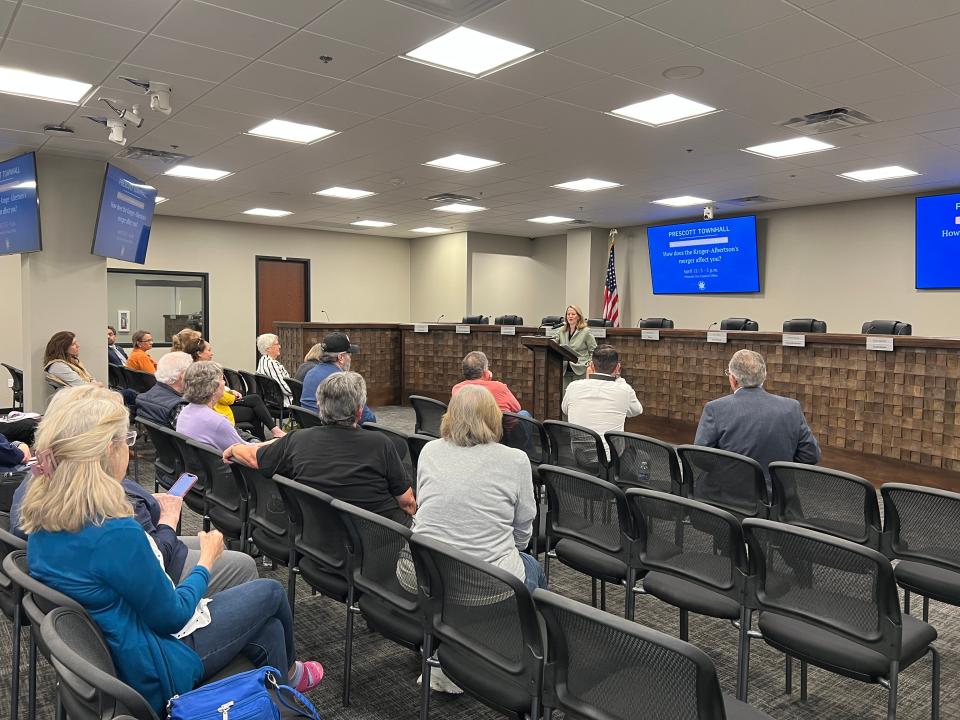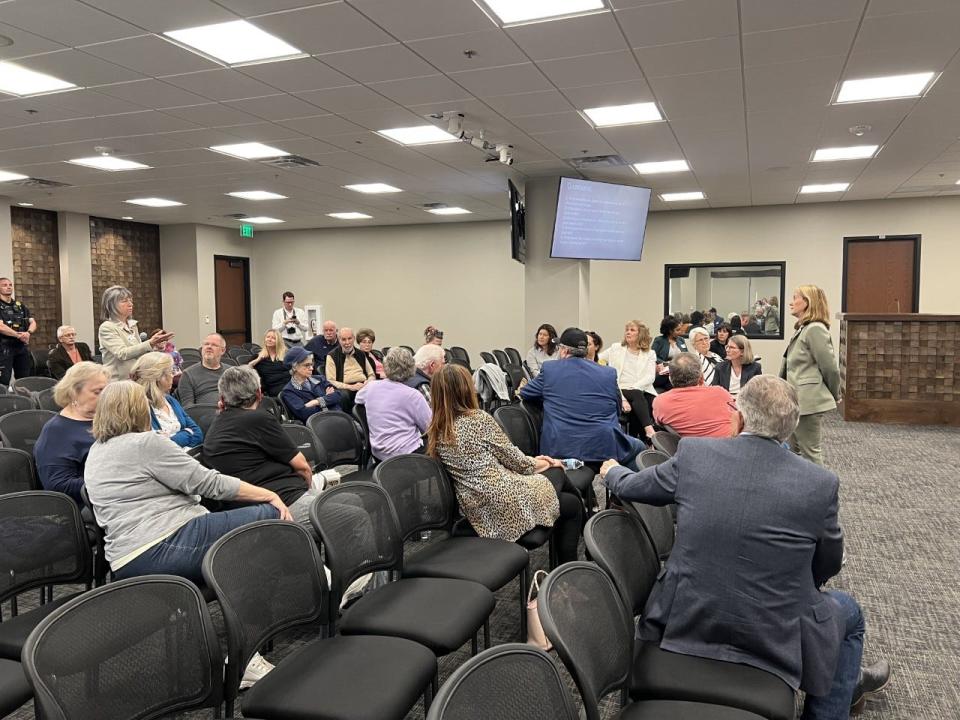Grocery merger could devastate rural communities, residents warn AG Kris Mayes
- Oops!Something went wrong.Please try again later.
PRESCOTT — Prescott, hometown of Arizona Attorney General Kris Mayes, was the latest stop as she hosts listening sessions about the potential merger of two of the state’s largest grocery store chains, Kroger Co., parent company of Smith’s and Fry’s Food & Drug Stores, and Albertsons Companies, which operates supermarkets under the Albertsons and Safeway brands.
Mayes is investigating whether the merger would violate the state’s antitrust laws. She is just one of a handful of attorneys general across the West that are looking into this deal, she said.
The Wednesday meeting was attended by a handful of local elected officials and residents from surrounding communities including Prescott Valley, Dewey, Wilhoit and Chino Valley. Almost everyone expressed concerns about the merger reducing competition and prompting closures, which they said would have widespread impact.
Together, the two companies employ around 35,000 Arizonans, making them two of the top six employers in the state.

Still fresh in the minds of many in central Arizona is the 2014 grocery deal that saw Albertsons sell 10 of its Arizona grocery stores to Pacific Northwest grocery chain Haggen, including three in northern Arizona. Almost immediately after cutting the ribbon, former employees said, the stores started shutting down and employees began losing their jobs.
Mary Mallory, now a Yavapai County supervisor for District 5, recalled how her long career as a store operations manager came to an unceremonious end because of the deal. Mallory herself was tasked with terminating hundreds of employees during this time. It was by the grace of God, she said, that her and her husband survived.
“I was the last person in that store to send payroll,” she said. “We were all longtime employees there, and it was devastating.”
“They told us we were all going to be OK,” Mallory said.
Now, her former Albertsons is a church, with pews lined up in what was once the produce section, she said. With the potential new merger, Mallory urged Mayes to ensure the companies are transparent with their employees, a courtesy she said they were not afforded in the past.
“We deserved an opportunity to take care of our families,” she said.

Residents spent years calling for more grocery stores
Echoing a similar sentiment shared during Mayes prior listening session in Kingman, residents have described grocery store lines growing longer as shelves become more bare. Many in these areas, including Chino Valley, have asked for another grocery store for years and now with the potential merger, could risk losing the limited number of stores they already have.
One resident presented Mayes with some staggering numbers. In the greater Prescott area, where there’s almost 59,000 people, they only have three full-service supermarkets. Compare that to Flagstaff, which has seven full-service grocery stores for just over 77,000 residents.
Cindy Blackmore, Chino Valley’s town manager, expressed concerns about the future of her town’s only Safeway if there was a merger. Their store is the only full-service grocer for miles, serving not only Chino Valley residents but also the surrounding areas including Paulden and Ash Fork.
Aldi: Discount grocery store to open its 10th location in metro Phoenix. What to expect
Economic necessity for small towns
Many rural towns, including both Chino Valley and Prescott Valley, utilize sales taxes instead of property taxes to make up their general fund. If the town’s only grocery stores were to close, which are often the largest retailers in these areas, it would eviscerate their current budget, Blackmore warned.
“If something were to happen and that store were to close, it would devastate our general fund,” Blackmore said. “That’s our largest source of income for our town.”
Additionally, the merger could have significant real estate implications. Right now, many competing grocery stores are relatively close to each other in these smaller towns. If the companies were to merge, residents worried that it would eliminate any incentive to continue operating multiple stores in a small area, further limiting their options.
These grocery chains are also frequently anchor tenants for strip malls and shopping centers that support countless other businesses. If they were to close, it would significantly impact smaller businesses, like nail salons and coffee shops that otherwise rely on the grocery store’s foot traffic for many customers.
Aside from the more obvious issues surrounding employment and food security, potentially losing these grocery stores would also mean losing vital community touchstones, they said.
Prescott Valley town councilor Brenda Dickinson described the many ways their local grocery stores contribute to the community including yearly Thanksgiving turkey drives, hosting car shows in the parking lot, and more. They also provide crucial donations to area food banks, she said.
“Both of these establishments support our community in a huge way and it would just be a huge loss in so many ways,” Dickinson said.
“I just start to panic when I hear this happening because we’ve been wanting so much to have another grocery store in the area,” she said.
Business: Kroger aims to be America's grocery store. The Biden administration may have other ideas
Specifics of the merger remain unclear
The companies have provided very little details about the actual logistics of the deal but Mayes said they have indicated they would like to complete the merger sometime early next year. As such, Mayes’ office will be conducting its investigation through the summer and will likely come to a decision on whether to block the deal by the end of the year.
Notably, the Western Growers Association has officially opposed the merger citing concerns it will limit where producers can sell goods for a competitive price.
Residents in the state’s urban areas shared similar concerns as their rural counterparts.
Mayes held another session on her tour Tuesday evening at the Southwest Mountain States Carpenters Union Hall in Phoenix, drawing a handful of workers and their union representatives. For about an hour, Mayes asked questions and listened as attendees aired similar worries that a monopoly could lead to stores being closed and job loss among grocery workers not protected by labor agreements.
The Attorney General’s office has already held similar listening sessions elsewhere across the state including Kingman, Tucson and Yuma and is planning to host a few more in the coming months, particularly one set in Holbrook, where a single Safeway serves more than 5,000 residents in town and in the surrounding areas.
Contact northern Arizona reporter Lacey Latch at LLatch@gannett.com or on social media @laceylatch. Coverage of northern Arizona on azcentral.com and in The Arizona Republic is funded by the nonprofit Report for America and a grant from the Vitalyst Health Foundation in association with The Arizona Republic.
This article originally appeared on Arizona Republic: Arizona rural communities face problems with Albertsons-Kroger merger

